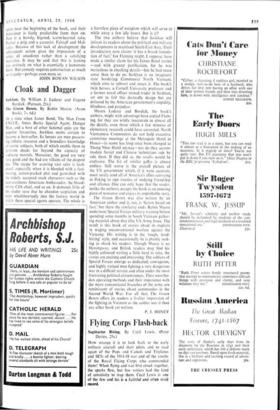Cloak and Dagger
Ar a time when James Bond, The Man From UNCLE, Amos Burke Special Agent, Danger Man, and a host of other fictional spies are the popular favourites, Sarkhan seems certain to become a best-seller. Its heroes are men possess- ing infinite resource and a boundless knowledge of exotic subjects, both of which enable them to perform deeds far beyond the capacity of ordinary mortals. Moreover, the good are very eery good and the bad are villains of the deepest dye. The recipe for assuring vast sales is fool- proof. especially when it is blended with a fast- moving, action-packed plot and garnished with Ihe widely accepted stock characters such as the near-cretinous American Ambassador, the blood- thirsty CIA chief, and so on. It demands little of The reader save that he abandon scepticism and enter wholeheartedly into the fantasy world in o,hich these special agents operate. The whole is
a harmless piece of escapism which will serve to while away a few idle hours. But is it?
The two authors believe that Sarkhan will inform its readers about the political and military developments in mainland South-East Asia. Their introductory note claims 'it has a broad founda- tion of fact.' Ian Fleming might, I suppose, have made a similar claim for his James Bond stories —and with greater justification, for he was meticulous in checking details—but he had more sense than to do so. Sarkhan is an imaginary state bordering Communist North Vietnam, which aims to subvert and annex it. The book's twin heroes, a Cornell University professor and a former naval officer turned trader in Sarkhan, set out to foil this dastardly design but are defeated by the American government's stupidity, blindness, and .prejudice.
Messrs Lederer and Burdick, the book's authors, might with advantage have copied Flem- ing, for they are wildly inaccurate in almost all the details, even those which a few minutes of elementary research could have corrected. North Vietnamese Communists do not hold executive committee meetings at the Metropole Hotel in Hanoi—its name has long since been changed to Thong Nhat Hotel anyway—nor do they accom- modate Soviet and Chinese technicians side by side there. If they did so, the results would be explosive. The list of similar gaffes is almost endless. Still worse is the overall picture of the US government which, if it were accurate, must surely send all of America's allies scurrying to Peking to sign treaties of undying friendship and alliance. One can only hope that the reader, unlike the authors, accepts the book as an amusing piece of nonsense and enjoys its improbable story.
The Green Berets was also written by an American author and it, too, is 'fiction based on fact,' but there the similarity ends. Robin Moore underwent Special Forces military training before spending some months in South Vietnam gather- ing material about that elite US Army force. The result is this book of stories about its exploits in waging unconventional warfare against the Vietcong. His writing is in the 'tough, hard- hitting' style, and occasionally he is plainly seek- ing to shock his readers. Though Moore is no Hemingway, and British readers may find his highly coloured writing a little hard to take, the stories are exciting and interesting. The soldiers of Special Forces emerge as dedicated, courageous, and highly trained men fighting a very dangerous war in a difficult terrain and often under the most frustrating political circumstances. Their unortho- dox operating methods and their impatience with the more conventional branches of the army are reminiscent of stories about commandos in the Second World War. For all that, The Green Berets offers its readers a livelier impression of the fighting in Vietnam as the soldier sees it than any other book yet written.
P. J. HONEY










































 Previous page
Previous page